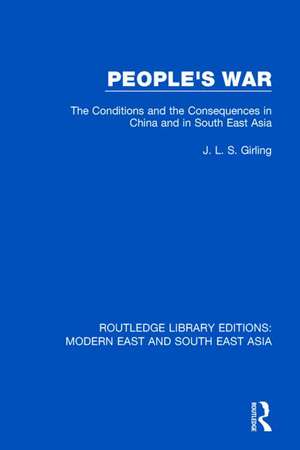People's War (RLE Modern East and South East Asia): The Conditions and the Consequences in China and in South East Asia: Routledge Library Editions: Modern East and South East Asia
Autor J.L.S. Girlingen Limba Engleză Paperback – 9 noi 2016
| Toate formatele și edițiile | Preț | Express |
|---|---|---|
| Paperback (1) | 239.32 lei 43-57 zile | |
| Taylor & Francis – 9 noi 2016 | 239.32 lei 43-57 zile | |
| Hardback (1) | 765.43 lei 43-57 zile | |
| Taylor & Francis – 15 apr 2015 | 765.43 lei 43-57 zile |
Preț: 239.32 lei
Preț vechi: 287.85 lei
-17% Nou
Puncte Express: 359
Preț estimativ în valută:
45.80€ • 47.69$ • 38.71£
45.80€ • 47.69$ • 38.71£
Carte tipărită la comandă
Livrare economică 10-24 martie
Preluare comenzi: 021 569.72.76
Specificații
ISBN-13: 9781138898349
ISBN-10: 1138898341
Pagini: 244
Dimensiuni: 156 x 234 mm
Greutate: 0.36 kg
Ediția:1
Editura: Taylor & Francis
Colecția Routledge
Seria Routledge Library Editions: Modern East and South East Asia
Locul publicării:Oxford, United Kingdom
ISBN-10: 1138898341
Pagini: 244
Dimensiuni: 156 x 234 mm
Greutate: 0.36 kg
Ediția:1
Editura: Taylor & Francis
Colecția Routledge
Seria Routledge Library Editions: Modern East and South East Asia
Locul publicării:Oxford, United Kingdom
Public țintă
Postgraduate and UndergraduateCuprins
1. The Scene. Revolution and Intervention in South East Asia 1.1. Communist Revolts: 1948 1.2. Sino-Soviet Dispute: (People’s) War and Peace 1.3. US Reaction: the Vietnam Commitment 1.4. Indonesia Reversal: New Balance of Power? 1.5. Domino-Land 2. The Model. China: Conditions for Success 2.1. Peasant Revolt: Mao’s Separate Course 2.2. Protracted War 2.3. National Appeal 2.4. Downfall of the Regime 3. Success. Struggle for Vietnam 3.1. August Insurrection 3.2. Resistance War 3.3. Unity and Organization 3.4. Vietminh-Vietcong 4. Failure 4.1. China in Maphilindo 4.2. Lessons from Malaya and the Philippines 4.3. Indonesian Exception 4.4. United States in Indochina 4.5. Post-War Policy 4.6. Confusion in Laos 4.7. Backing into Vietnam 4.8. Peace – and the Tet Offensive
Descriere
This book, first published in 1969, casts a critical eye over the problem of insurgency. The author sees insurgency not just as a matter of technique – military tactics or organizational skill – nor as the result of ‘force and fraud’, but as ‘people’s war’: the conditions in which the mass of the people become involved, voluntarily or otherwise, on either side. He quotes Nasution’s statement, ‘The guerrilla movement is only the result, not the cause of the problem’. People’s war brings the peasantry, hitherto ignorant, apathetic or rejected, into the political process. For ‘war is … the continuation of politics by other means’. In Asia this was essentially a peasant’s war, arising when peasant grievances, interests or demands cannot be met under the existing ‘legitimate’ but urban or landowner-orientated system of rule. It shows little understanding to blame outside intervention when peasant – and nationalist – unrest leads to revolt. The Chinese Communists did not owe success to Soviet aid, the Vietminh to Chinese assistance or the Vietcong to North Vietnamese intervention. The conclusion applies to governments as to insurgents: no amount of outside aid can win the war for them if they themselves are incapable and the people – on whom they depend for support – have no will to fight. This book, based on first-hand experience of the area and on study of original sources, offers (1) an analysis of ‘people’s war’ in China, Indochina and Vietnam, (2) a critique of US policy in Laos and Vietnam and (3) a comparison with counter-measures in Malaya, the Philippines and Indonesia. It is both original and constructive.






